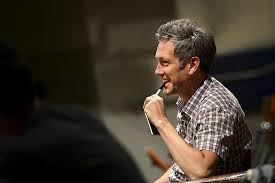Sound SeriesRichard Maxwell’s “The Evening”

Richard Maxwell
On October 23, for one night only, we proudly present “The Evening” by playwright and director Richard Maxwell and his company The New York City Players, in partnership with the New Hazlett Theater. Maxwell has had a significant influence on the trajectory of what has come to be known as “performance theater.” Mark Russell, the founding director of Performance Space 122 (PS122) in New York, who was a key partner in the development of our live arts program at The Warhol (launched in 2000), wrote an insightful essay “The Happy Awkward Moment” in Village Voice in 2002, about performance theater. At that stage it was in early development as a sub-genre of experimental theater and performance art, and Richard Maxwell was one of prime examples Russell cited. I’ve consistently referenced Russell’s article over my 15-year tenure at The Warhol, and, for me, these key points from that article are still completely relevant:
1. Performance theater developed as a reaction to the pervasiveness of our collective mediated experience. Audiences seek out venues such as PS122 (or The Warhol) to come to small, dark theaters to have an immediate, intimate, raw, and “real” shared experience.
2. Performance theater artists tend to deconstruct traditional theater conditions and conventions and thereby reduce theater to its basic essentials.
3. The acting style is often referred to as stiff, awkward, and “wooden,” with simple, almost monotone, delivery, which intentionally seems to emphasize the writing over delivery and raw, genuine emotion over melodramatic acting.
4. There is an inherent element of trickery involved with the intent to “unsettle” audiences, to keep them guessing and not allow them to settle back in their seats to follow predictable narratives. Through an awareness of traditional theater tropes, performance theater directors and actors tend to subvert avant-garde clichés, such as naturalism and overdone and absurdist techniques.
This last point regarding unsettling audiences and subversion particularly resonates with me regarding Warhol’s work and practice. One example that comes to mind is his foray into the world of performance art in 1966 with Andy Warhol Up-tight (the precursor to The Exploding Plastic Inevitable), with the intent of creating tension, confusion, and cacophony from the rock n’ roll “noise” of The Velvet Underground and interrogation-esque performance techniques of filmmaker Barbara Rubin. Another is his series of almost 500 portrait films, the Screen Tests, which were his subversive take on mainstream, Hollywood screen tests. Though instead of testing for film roles, Warhol’s versions were meant more to capture, collect, and document personalities around his scene at the Silver Factory.

Richard Maxwell was the recipient of the 2014 Spalding Gray Award and “The Evening” is the resulting work of that award and commission that involves a partnership The Warhol has valued for the past five years with PS122 in New York, The Walker Art Center in Minneapolis, and On the Boards in Seattle.
Here are a few comments from Maxwell from the press release announcing the award.
“It’s a great honor to receive the Spalding Gray Award,” said Maxwell. “I feel fortunate to be included in the roster of past winners, and I also feel grateful to know Spalding’s work, to have seen it live, and to even have encountered Spalding on occasion, e.g., as he cheerfully darted inside to use the downstairs phone at the Performing Garage. Spalding and his work helped define for me what it means to be a non-native New Yorker. Entering and acclimating as a nervy transplant, I was helped along by Spalding’s wry recounting of his experiences in the city and around the world.
I hope with my next work to identify some universality in locality. Everybody says and will continue to say New York isn’t what it was. Time marches on and as the landscape gets higher and shinier we get further and further from Spalding’s passing. And perhaps you could say the city goes on without him, but for a second let’s recall how Spalding had the uncanny ability to hold time still. No one in theater performance was like Spalding. I suppose it’s fitting then to use my award to help make a work of theater that in many ways is a return to my earlier more spare writing. I also like to tell stories, and I believe in plot lines, I believe in leanness, purposefulness, and in the merciless fate of characters once conditions are put into play.”
The Spalding Gray Award supports gifted writer/performers who fully realize both aspects of Spalding’s legacy as a monologist and performance artist, who are fearless innovators of theatrical form, who reach into daily experience and create resonant, transcendent work that makes us wiser and, somehow, more enlightened than we were when we entered the theater.
I’d also like to share a rather smart and entertaining video review by the incomparable cultural critics and artistic duo AndrewAndrew, from the New York premiere of “The Evening” at The Kitchen.
“The Evening is everything!”
— AndrewAndrew
Lastly, I’d like to share a link to an interview (commissioned by the Walker) with Richard Maxwell, conducted by Sarah Benson, artistic director of SoHo Rep, to provide further context around Maxwell’s body of work and future endeavors.
I hope you can join us for Richard Maxwell’s “The Evening” October 23, 2015, 8 p.m., at the New Hazlett Theater on the city’s Northside. As always, thanks for riding the wave with us.